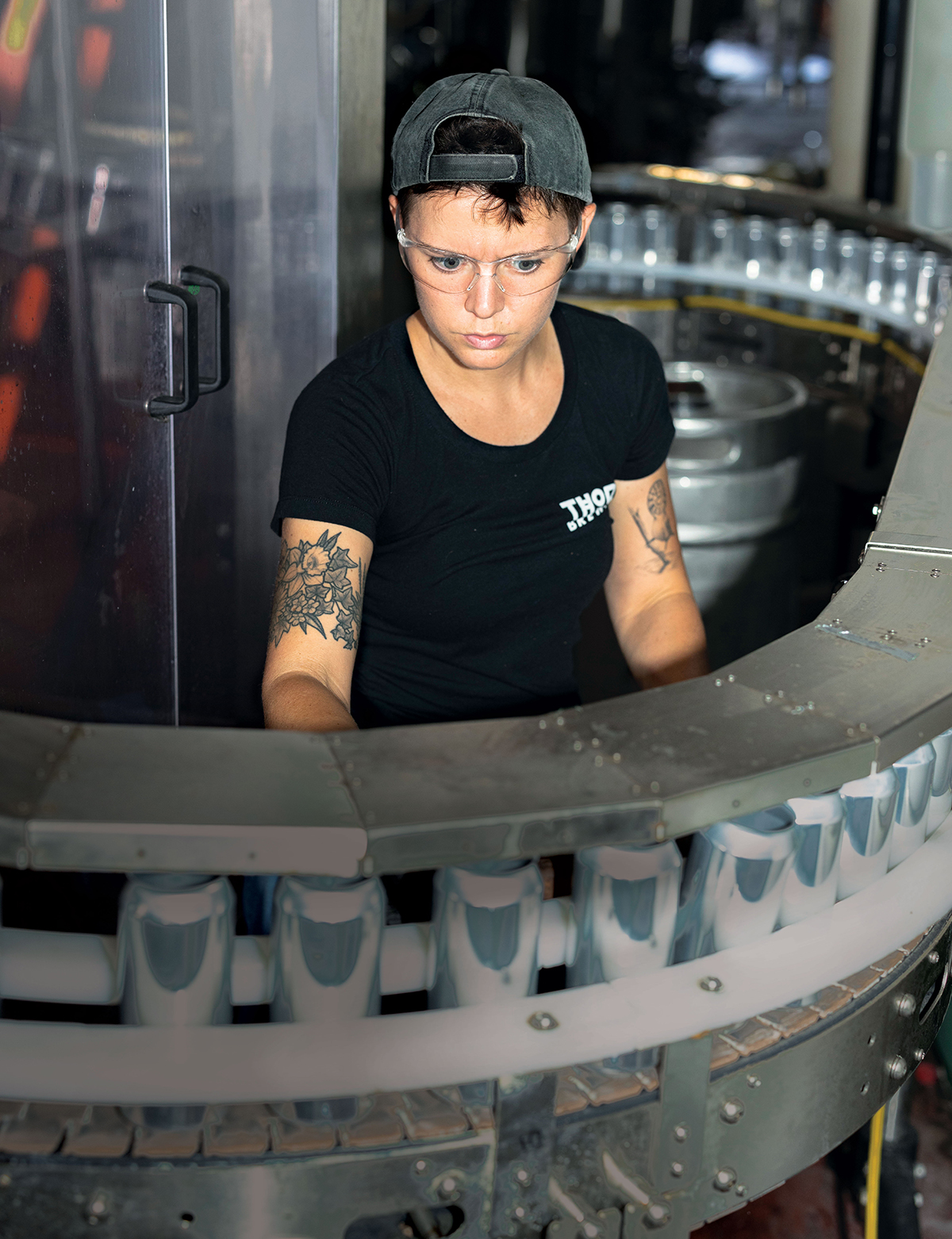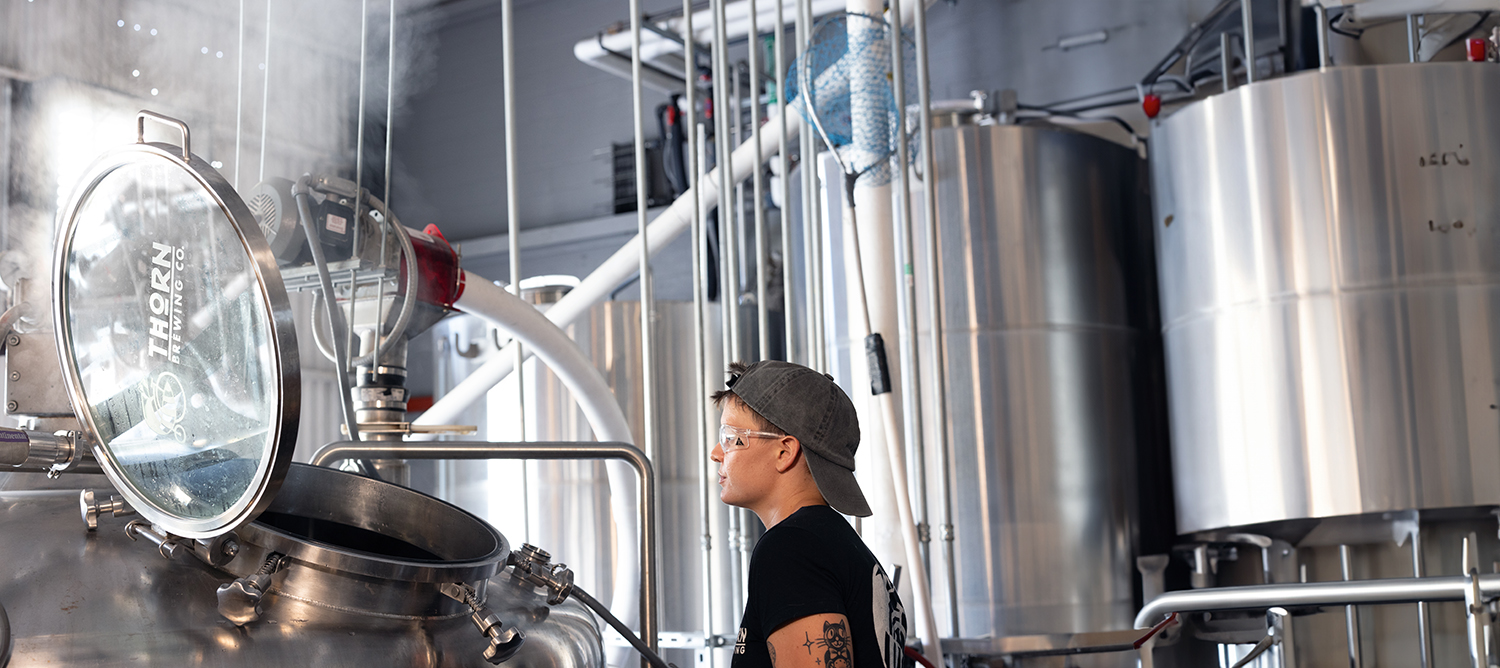It’s 6 A.M. in Barrio Logan, an industrial artist’s enclave that hugs the bay side of the San Diego Freeway. At this hour, the city’s iconic shipyards aren’t the only areas bustling. A few blocks from the waterfront, Thorn Brewing Company has just cranked up its equipment: glycol chillers, lauter tuns, boil kettles, fermenters, a tunnel pasteurizer, a canning line. Today begins another 14-hour shift to brew or can tens of thousands of beverages, from Thorn’s award-winning craft beers to hard seltzers and ready-to-drink cocktails.
Shawn Steele, Thorn’s director of operations, keeps a close eye on it all. Temperatures matter to Shawn – not just inside those tanks, but outside the brewery as well. Once the sun crests the apartment lofts across the street, Shawn knows the clock is ticking. Sunlight means a few hundred solar panels on the brewery’s rooftop can turn all that California sun into much-needed electrons for the operations below, and, depending on the time of day, can help ease strain on the power grid.
The Barrio Logan facility eclipses Thorn’s other locations, a smaller brewhouse in San Diego’s North Park neighborhood and a tasting room in the city’s Mission Hills area. Shawn reckons that Barrio uses three times more energy than North Park and Mission Hills combined.
“We have a chiller that's always running to maintain temperature at the tanks, and then we're basically running the production floor from 6 in the morning until sometimes 8 at night,” Shawn says. “We’re always consuming energy in one form or another. Running motors, running chillers, using natural gas. All of it.”
Team members like Shawn bring all their energy to tackle sustainability at Thorn Brewing, the same way they work to honor the communities they call home. In turn, SDG&E brings the energy for Thorn Brewing, one of more than 3.7 million customers in San Diego and south Orange County.

Bringing the energy to renewable solutions
Thorn opened the Barrio Logan location in 2017, then a satellite to the brewery’s North Park beginnings. The Mission Hills tasting lounge, complete with Skee-Ball machines and hanging merch, opened in 2019. Barrio Logan operates most of the company’s brewing and canning operations, even using its canning line – which cranks out 80 cans per minute – to package beer and mixed drinks for other breweries. All of that made energy consumption critical from the start.
Thorn got to work as soon as it set foot on the location, a nearly century-old warehouse on National Avenue. Out went the conventional 120-volt single-phase power supply, replaced by 480-volt three-phase power that provides industrial-strength voltage with lower line losses for better efficiency. The brewery procured equipment with variable-frequency drives, essentially motors that can scale down from 100% if full power isn’t needed. Then came the solar panels – first in 2016 at North Park, then eventually at Barrio Logan, making Thorn Brewing the first San Diego brewery to go solar, says CEO Marc Martin. In the three years since, it’s allowed Thorn to cut its electricity bills dramatically.
Before Barrio, Thorn’s primary focus was to hone its beermaking craft. But once its operation expanded – it now has two 2,500-square-foot refrigeration rooms that run 24 hours a day – the brewers had “to start looking at efficiency in all its different aspects, whether it’s labor or energy or raw materials and packaging goods,” says Eric O’Connor, one of Thorn’s founders.
Their secret weapon? Shawn’s eye for efficiency. He hatched a plan to cycle the brewery’s glycol chillers – huge refrigeration units that use heat-exchange piping to cool the beer in Thorn’s fermentation and conditioning tanks – down during peak-rate afternoon and evening hours, then run them harder earlier in the day when Barrio’s solar panels draw the most power.
“We can have some pretty big draws when we’re trying to chill beers down or trying to chill water down,” Shawn explains. “In peak afternoon and evening hours, the price of electricity is higher, and that’s typically a time when we have to draw a ton of power. We programmed our chiller to say, hey, we want these beers to get cold. But between 4 o’clock and 9 o’clock, please stop for a little while or only do 1 degree per hour, so that we're not putting this huge load on our system.”
Beyond helping Thorn’s bottom line, this approach also eases strain on the electric grid during peak demand – supporting infrastructure sustainability for SDG&E customers throughout San Diego and south Orange County.
Energy efficiency and renewable electricity are only one part of Thorn Brewing’s sustainability efforts. Sharing Thorn’s Barrio Logan warehouse is ReBru Spirits, a distillery started by Thorn co-founder Dennis O’Connor (no relation to Eric). ReBru leverages expired beer from Thorn to form “distiller’s beer,” a base material for distilling spirits. Traditionally formed with fermented wort during the beermaking process, distiller’s beer is increasingly being enjoyed as much as traditional beer – and ReBru is using it to give Thorn’s cast-off brews a second life.
“When beer doesn’t meet quality standards anymore, a lot of breweries just dump it,” says Haley Wolf, Thorn’s canning-line operator. “We partner with ReBru Spirits to give it a second life, which is pretty cool.”
From giving old beer new life to keeping energy usage sustainable, Thorn is trying to be a good citizen in its San Diego locales. And, as Haley explains, that makes for some creative forms of community involvement.
"In peak afternoon and evening hours, the price of electricity is higher, and that’s typically a time when we have to draw a ton of power. We programmed our chiller to say, hey, we want these beers to get cold. But between 4 o’clock and 9 o’clock, please stop for a little while or only do 1 degree per hour, so that we're not putting this huge load on our system."
Crafting community, too
Thorn started out as a homebrew shop for budding DIY beermakers. The shop owners decided to try their hand at forming a brewery, and Thorn Street Brewery began in 2012. Named after its street in North Park, Thorn established a whimsical logo – a raccoon perched atop a bicycle, both staples in the neighborhood. Its founders saw the brewery as an extension of their neighbors, an unofficial judging committee for their kitchen brews.
“We were making a bunch of beer for people around the neighborhood to try,” Eric says. “So, we took the plunge. We pulled all our piggy banks together and bought some beermaking equipment, the best we could afford, which was pretty cheap equipment at the time. We threw the parachutes out of the plane and then jumped out and found them on the way down.”
And find them, Thorn did. The brewery became a community hub for friends and family to drop by – a “good place to just hang out, chill and relax, maybe watch a couple games,” Haley says. Eventually Thorn wanted to bring the community vibe to a larger production facility. The decision that would land the company in Barrio Logan, San Diego’s artsy warehouse district that boasts the mural-filled Chicano Park.
From there, Thorn focused on becoming ingrained in the new neighborhood. Thorn’s founders joined community boards to learn about local needs. Whenever possible, Thorn hired employees from the neighborhood, so residents knew the team, Marc says. And today that collaboration extends to local artists for Thorn’s new Shades of Haze line, a four-beer series of hazy IPAs. The can designs feature everything from the Mesoamerican patterns of Hector Villegas, a Barrio Logan artist and first-generation Chicano, to the bulgy-eyed cartoons of North Park’s Christopher Serrano. For its third Shades of Haze release, Thorn adapted Mission Hills native R. Piper’s larger-than-life mural of its raccoon in the Mission Hills tasting lounge as a pint-sized encore.
Delivering the energy, powering the community
One thing is clear: Thorn’s 25 employees are passionate about sustainability and community. Delivering all that energy is SDG&E, which also provided Thorn with monitoring equipment on its chiller case. O’Conner says that’s helped the brewery track important data on energy use.
Thorn is looking to do more. Shawn says he’d like to explore the possibility of onsite batteries to store some of the extra solar power generated during the day and dole it back during peak evening hours. And Haley says she’d love Thorn to implement new ways to make the brewery’s water usage more sustainable.
“It all works because it’s all built around the beer at the end of the day, so it’s a lot of fun,” CEO Marc says. “I’ve lived in San Diego pretty much my whole life. To be able to work in the craft beer business on top of all of that? Come on. It’s a pretty good setup, so I’m very fortunate that way. I really get driven by trying to help my employees succeed.”
